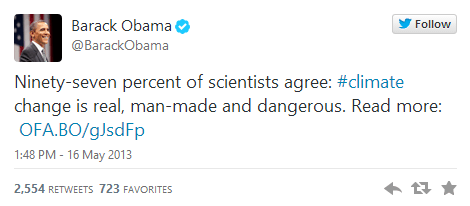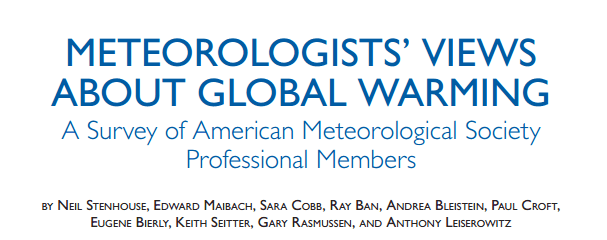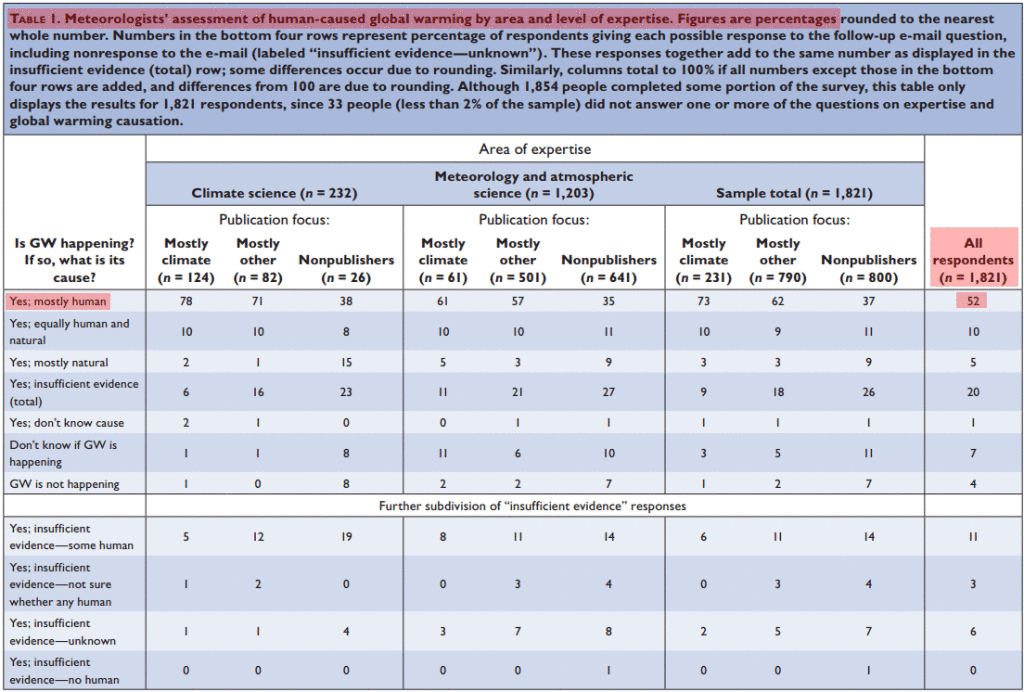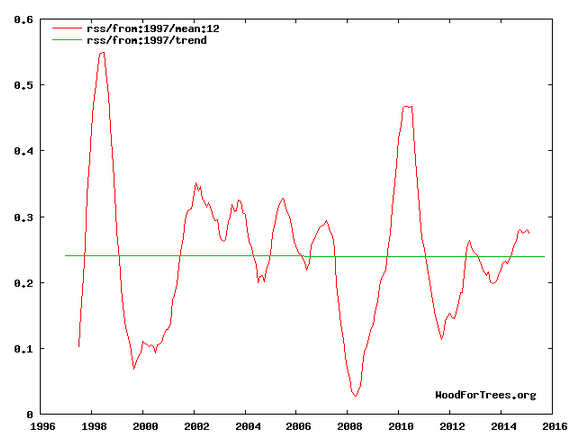The president of the United States made this spectacularly fraudulent claim about scientists.
There isn’t one smidgen of truth to Barack Obama’s claim. The only relevant survey on this topic showed that barely half of scientists believe global warming is primarily Mann-made, much less dangerous.
http://journals.ametsoc.org/doi/pdf/10.1175/BAMS-D-13-00091.1
Even more damning for Obama’s fraudulent claim is that 100% of satellites say that Earth has not warmed for nearly 20 years.






Seventy-nine scientists agree, climate change is real, man-made and dangerous.
Fixed it! Skeeter is just a little confused.
Seventy-nine make believe scientists agree, climate change is real, man. Pfffffffft. Want a hit?
Well, I was going to make a half-jest comment that “anyone who thinks that Obama can be believed probably will also believe that 97% figure!” Then I realized that there is no jest at all in saying that. That really does pretty well describe the situation.
They don’t believe, they are lying. You don’t have to believe anything to lie.
It is for the ‘CAUSE ™’
Again with the 97%?
As Legates et al., 2013 pointed out, Cook defined the consensus as “most warming since 1950 is anthropogenic.” Cook then relied on three different levels of “endorsement” of that consensus and excluded 67% of the abstracts reviewed because they neither endorsed nor rejected the consensus.
Doran and Kendall Zimmerman, 2009
An invitation to participate in the survey was sent to 10,257 Earth scientists. The database was built from Keane and Martinez [2007], which lists all geosciences faculty at reporting academic institutions, along with researchers at state geologic surveys associated with local Universities, and researchers at U.S. federal research facilities (e.g., U.S. Geological Survey, NASA, and NOAA (U.S. National Oceanic and Atmospheric Administration) facilities; U.S. Department of Energy national laboratories; (and so forth). [Note – no private sector scientist need apply or vote]
This brief report addresses the two primary questions of the survey
With 3146 individuals completing.
In our survey, the most specialized and knowledgeable respondents (with regard to climate change) are those who listed climate science as their area of expertise and who also have published more than 50% of their recent peer-reviewed papers on the subject of climate change (79 individuals in total). Of these specialists, 96.2% (76 of 79) answered “risen” to question 1 and 97.4% (75 of 77) answered yes to question 2.
the AMS survey Stenhouse et al., 2014.
In this survey, global warming was defined as “the premise that the world’s average temperature has been increasing over the past 150 years, may be increasing more in the future, and that the world’s climate may change as a result.”
Questions –
So answering the questions –
1) most warming since 1950 is anthropogenic?
2) When compared with pre-1800s levels, do you think that mean global temperatures have generally risen, fallen, or remained relatively constant?
3) Do you think human activity is a significant contributing factor in changing mean global temperatures?
4) Regardless of the cause, do you think that global warming is happening?
5) How sure are you that global warming (a. is /b. is not) happening?
Answers and questions use generalized words of most, think, significant, contributing and no values or significance is asked for. No where is proof or dates or amounts or data of +/- estimates required and did you see CO2 anywhere?
Do these questions really provide the answer that; stopping man-made, catastrophizing, CO2 control knob, ever increasing (global warming / climate change / disruption / weirding ) [pick 1 or more], which can only be prevented by higher taxes, more regulations and a loss of personal freedom will actually keep us all from floating down the River Styx in a handbasket?
It’s hard for an ‘outsider’ (Swede) to grasp why this ‘man’ (Mr Nobama) hasn’t been impeached yet. Our government is filled with people who excel in lying/confusing and more, but we do not even have a chance of impeaching – we do not even have a supreme court, one of the very few countries in the world! And since 1974 (thanks to Mr Palme) we, the people, can only by very tough and expensive means prosecute any official servant. Think about that when you see/hear/learn about the ‘worlds conscience’… We’re more of a banana republic than i.e. Zimbabwe is…
“My country hurts” as stated by a Danish poet at the crisis times in Denmark in the 1980:ies.
Regards from Sweden/TJ
thojak,
There are two problems.
The first is Obama is impeachment proof because his Vice President is even worse than he is and we can not toss both out. It used to be the VP was the guy who got second place in the election. The worked a lot better for the general population. Now the ‘Party’ picks the Vice President.
Second, it is Congress that impeaches not the people and we have had democrats and RINOS (Republican in Name Only) in Congress. In other words a one party government.
Third to impeach: The House of Representatives must first pass, (by a simple majority) articles of impeachment, the formal statement of charges. To convict the accused, a two-thirds majority of the senators present is required.
The President, the Vice President, and all civil Officers of the United States, may be impeached and removed only for “treason, bribery, or other high crimes and misdemeanors”
There are two problems.
The first is… Second… Third…
You may as well mention the fourth reason now. 😉
Top Senate Democrat: bankers “own” the U.S. Congress
(Ducks and runs….)
excerpts from the book Tragedy and Hope: A History of the World in Our Time
by Carroll Quigley, 1966 (Quigley was Bill Clinton’s mentor and Clinton is the one who signed the five banking laws that caused the 2008 housing market crash.
So yes there were differences in the bankers vs Banksters.
Also note the Chinese Stock Market has managed to crash now too. If you suck up all the wealth of the consumers in the West for Climate Activities there is nothing left but money for housing and food.
China’s stock market is about to tank — again
https://www.youtube.com/watch?v=cMnSp4qEXNM
Don’t get me started…
The White House Warned Congress About Fannie Mae Freddie Mac 17 Times In 2008, Alone
September, 21, 2008 —
The White House attempts to set the record straight:
(I’m copying this post from the White House webpage in it’s entirety because I want people to read the whole thing).
For many years the President and his Administration have not only warned of the systemic consequences of financial turmoil at a housing government-sponsored enterprise (GSE) but also put forward thoughtful plans to reduce the risk that either Fannie Mae or Freddie Mac would encounter such difficulties. President Bush publicly called for GSE reform 17 times in 2008 alone before Congress acted. Unfortunately, these warnings went unheeded, as the President’s repeated attempts to reform the supervision of these entities were thwarted by the legislative maneuvering of those who emphatically denied there were problems.
2001
April: The Administration’s FY02 budget declares that the size of Fannie Mae and Freddie Mac is “a potential problem,” because “financial trouble of a large GSE could cause strong repercussions in financial markets, affecting Federally insured entities and economic activity.”
2002
May: The President calls for the disclosure and corporate governance principles contained in his 10-point plan for corporate responsibility to apply to Fannie Mae and Freddie Mac. (OMB Prompt Letter to OFHEO, 5/29/02)
2003
January: Freddie Mac announces it has to restate financial results for the previous three years.
February: The Office of Federal Housing Enterprise Oversight (OFHEO) releases a report explaining that “although investors perceive an implicit Federal guarantee of [GSE] obligations,” “the government has provided no explicit legal backing for them.” As a consequence, unexpected problems at a GSE could immediately spread into financial sectors beyond the housing market. (“Systemic Risk: Fannie Mae, Freddie Mac and the Role of OFHEO,” OFHEO Report, 2/4/03).
September: Fannie Mae discloses SEC investigation and acknowledges OFHEO’s review found earnings manipulations.
September: Treasury Secretary John Snow testifies before the House Financial Services Committee to recommend that Congress enact “legislation to create a new Federal agency to regulate and supervise the financial activities of our housing-related government sponsored enterprises” and set prudent and appropriate minimum capital adequacy requirements.
October: Fannie Mae discloses $1.2 billion accounting error.
November: Council of the Economic Advisers (CEA) Chairman Greg Mankiw explains that any “legislation to reform GSE regulation should empower the new regulator with sufficient strength and credibility to reduce systemic risk.” To reduce the potential for systemic instability, the regulator would have “broad authority to set both risk-based and minimum capital standards” and “receivership powers necessary to wind down the affairs of a troubled GSE.” (N. Gregory Mankiw, Remarks At The Conference Of State Bank Supervisors State Banking Summit And Leadership, 11/6/03).
2004
February: The President’s FY05 Budget againhighlights the risk posed by the explosive growth of the GSEs and their low levels of required capital, and called for creation of a new, world-class regulator: “The Administration has determined that the safety and soundness regulators of the housing GSEs lack sufficient power and stature to meet their responsibilities, and therefore…should be replaced with a new strengthened regulator.” (2005 Budget Analytic Perspectives, pg. 83)
February: CEA Chairman Mankiw cautions Congress to “not take [the financial market’s] strength for granted.” Again, the call from the Administration was to reduce this risk by “ensuring that the housing GSEs are overseen by an effective regulator.” (N. Gregory Mankiw, Op-Ed, “Keeping Fannie And Freddie’s House In Order,” Financial Times, 2/24/04).
June: Deputy Secretary of Treasury Samuel Bodman spotlights the risk posed by the GSEs and called for reform, saying “We do not have a world-class system of supervision of the housing government sponsored enterprises (GSEs), even though the importance of the housing financial system that the GSEs serve demands the best in supervision to ensure the long-term vitality of that system. Therefore, the Administration has called for a new, first class, regulatory supervisor for the three housing GSEs: Fannie Mae, Freddie Mac, and the Federal Home Loan Banking System.” (Samuel Bodman, House Financial Services Subcommittee on Oversight and Investigations Testimony, 6/16/04).
2005
April: Treasury Secretary John Snow repeats his call for GSE reform, saying “Events that have transpired since I testified before this Committee in 2003 reinforce concerns over the systemic risks posed by the GSEs and further highlight the need for real GSE reform to ensure that our housing finance system remains a strong and vibrant source of funding for expanding homeownership opportunities in America… Half-measures will only exacerbate the risks to our financial system.” (Secretary John W. Snow, “Testimony Before The U.S. House Financial Services Committee,” 4/13/05).
2007
July: Two Bear Stearns hedge funds invested in mortgage securities collapse.
August: President Bush emphatically calls on Congress to pass a reform package for Fannie Mae and Freddie Mac, saying “first things first when it comes to those two institutions. Congress needs to get them reformed, get them streamlined, get them focused, and then I will consider other options.” (President George W. Bush, Press Conference, The White House, 8/9/07).
September: RealtyTrac announces foreclosure filings up 243,000 in August – up 115 percent from the year before.
September: Single-family existing home sales decreases 7.5 percent from the previous month – the lowest level in nine years. Median sale price of existing homes fell six percent from the year before.
December: President Bush again warns Congress of the need to pass legislation reforming GSEs, saying “These institutions provide liquidity in the mortgage market that benefits millions of homeowners, and it is vital they operate safely and operate soundly. So I’ve called on Congress to pass legislation that strengthens independent regulation of the GSEs – and ensures they focus on their important housing mission. The GSE reform bill passed by the House earlier this year is a good start. But the Senate has not acted. And the United States Senate needs to pass this legislation soon.” (President George W. Bush, Discusses Housing, The White House, 12/6/07).
2008
January: Bank of America announces it will buy Countrywide.
January: Citigroup announces mortgage portfolio lost $18.1 billion in value.
February: Assistant Secretary David Nason reiterates the urgency of reforms, says “A new regulatory structure for the housing GSEs is essential if these entities are to continue to perform their public mission successfully.” (David Nason, Testimony On Reforming GSE Regulation, Senate Committee On Banking, Housing And Urban Affairs, 2/7/08).
March: Bear Stearns announces it will sell itself to JPMorgan Chase.
March: President Bush calls on Congress to take action and “move forward with reforms on Fannie Mae and Freddie Mac. They need to continue to modernize the FHA, as well as allow State housing agencies to issue tax-free bonds to homeowners to refinance their mortgages.” (President George W. Bush, Remarks To The Economic Club Of New York, New York, NY, 3/14/08).
April: President Bush urges Congress to pass the much needed legislation and “modernize Fannie Mae and Freddie Mac. [There are] constructive things Congress can do that will encourage the housing market to correct quickly by … helping people stay in their homes.” (President George W. Bush, Meeting With Cabinet, the White House, 4/14/08).
May: President Bush issues several pleas to Congress to pass legislation reforming Fannie Mae and Freddie Mac before the situation deteriorates further.
“Americans are concerned about making their mortgage payments and keeping their homes. Yet Congress has failed to pass legislation I have repeatedly requested to modernize the Federal Housing Administration that will help more families stay in their homes, reform Fannie Mae and Freddie Mac to ensure they focus on their housing mission, and allow State housing agencies to issue tax-free bonds to refinance sub-prime loans.” (President George W. Bush, Radio Address, 5/3/08).
“[T]he government ought to be helping creditworthy people stay in their homes. And one way we can do that – and Congress is making progress on this – is the reform of Fannie Mae and Freddie Mac. That reform will come with a strong, independent regulator.” (President George W. Bush, Meeting With The Secretary Of The Treasury, the White House, 5/19/08).
“Congress needs to pass legislation to modernize the Federal Housing Administration, reform Fannie Mae and Freddie Mac to ensure they focus on their housing mission, and allow State housing agencies to issue tax-free bonds to refinance subprime loans.” (President George W. Bush, Radio Address, 5/31/08).
June: As foreclosure rates continued to rise in the first quarter, the President once again asks Congress to take the necessary measures to address this challenge, saying “we need to pass legislation to reform Fannie Mae and Freddie Mac.” (President George W. Bush, Remarks At Swearing In Ceremony For Secretary Of Housing And Urban Development, Washington, D.C., 6/6/08).
July: Congress heeds the President’s call for action and passes reform of Fannie Mae and Freddie Mac as it becomes clear that the institutions are failing.
So what you’re saying, Gator, is that it’s all Bush’s fault. If only he’d been smart enough to convince the babbling imbeciles in congress, the whole crash could have been averted.
What will be really fun to watch is how, when the duct tape and bailing wire finally give way, the next crash will be blamed on Bush, too. Unless, of course, they can keep it together until the election. If it falls apart next December, it’ll be blamed on the mere anticipation of the new president elect. I actually heard that argument during the slowdown before Clinton left office.
I have worked in banking and finance for decades now (which is weird, because my background is geology) and I remember reading about the gubmint plans to ramp up the CRA, and remember thinking that was a really bad idea. As a young man I worked in one of the worst and poorest cities in the US, and I knew that investments in places where they are not respected are doomed. But nobody asked me.
Thanks for the info, Gail ! 🙂
Cheers!
//TJ